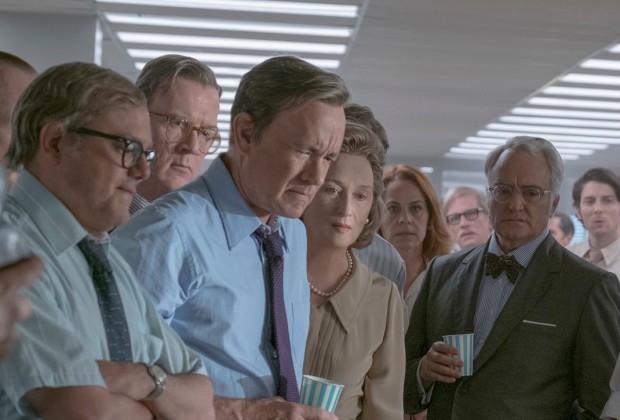By Mark Saldana
Rating: 3.5 (Out of 4 Stars)
Between 1972 and 1973, Washington Post reporters Carl Bernstein and Bob Woodward covered the Watergate break-in and the subsequent scandal and their investigative reporting helped uncover a conspiracy within the White House. This actually wasn’t the first time that the reporting of the Washington Post would take on the U.S. government and won. Not long before Watergate, the Post took a huge risk on a major gamble that could have ended the newspaper and set back freedom of the press for future generations. Steven Spielberg’s new film, The Post, tells this riveting story and features fantastic performances by a wonderful ensemble cast.
Washington Post publisher Kay Graham (Meryl Streep) and Ben Bradlee (Tom Hanks) both reach a major crossroads in their newspaper careers. Graham inherits the newspaper from her husband and becomes the first female publisher to head a newspaper. Scrutinized by all of the men below her, Graham must prove herself worthy of the job and stand her ground whenever challenged. Editor Ben Bradlee (Tom Hanks) is sick and tired of being disrespected by other more reputable newspapers and really wants to elevate reputation of the Washington Post. When evidence of a government cover-up lasting through four U.S. presidents comes to light. Bradlee and his staff are hungry for the opportunity to get involved in this major story, but Kay must decide if taking on the U.S. government is worth risking any vindictive responses by President Nixon.
Written by Liz Hannah and Josh Singer (Spotlight), Spielberg’s The Post is a tense and engrossing film that honors and celebrates the power of the press. Not quite as procedural as All the President’s Men or Spotlight, Spielberg’s movie has his signature sweetness and earnestness with all of his trademark crescendos and flourishes (enhanced musically by John Williams’s score). This take on a journalism movie does lack some of the gritty realness that other movies with similar stories have. Still, that usually isn’t Spielberg’s style. The director wants to make this a heroic piece where journalists take on the adversity of the government and have his audiences applauding and exchanging high fives in the end.
Despite the rose-tinted, Hollywood lens that captures this film, the phenomenal cast members all play their parts well and genuinely feel like the hard working staff of a newspaper. In addition to the famous leads, the cast feature tremendous work by Sarah Paulson, Bob Odenkirk, Tracy Letts, Bradley Whitford, Bruce Greenwood, Allison Brie, and so much more. Both Hanks and Streep, however, are born to play the leaders of The Post and absolutely shine as expected. Meryl Streep and Tom Hanks are superstars because not only audiences do love them, but we totally buy whatever role they play.
Even though it might be easy for some to scoff at Spielberg’s big-hearted earnestness in some of his movies, most of the time it works so wonderfully well. That is mostly the case with The Post, a genuinely triumphant piece of cinema that had me pumping my fist at the end, but also had me laughing at myself because of it. It may not be the most realistic movie covering a great moment in journalism history, but it probably is the most enjoyable one.
